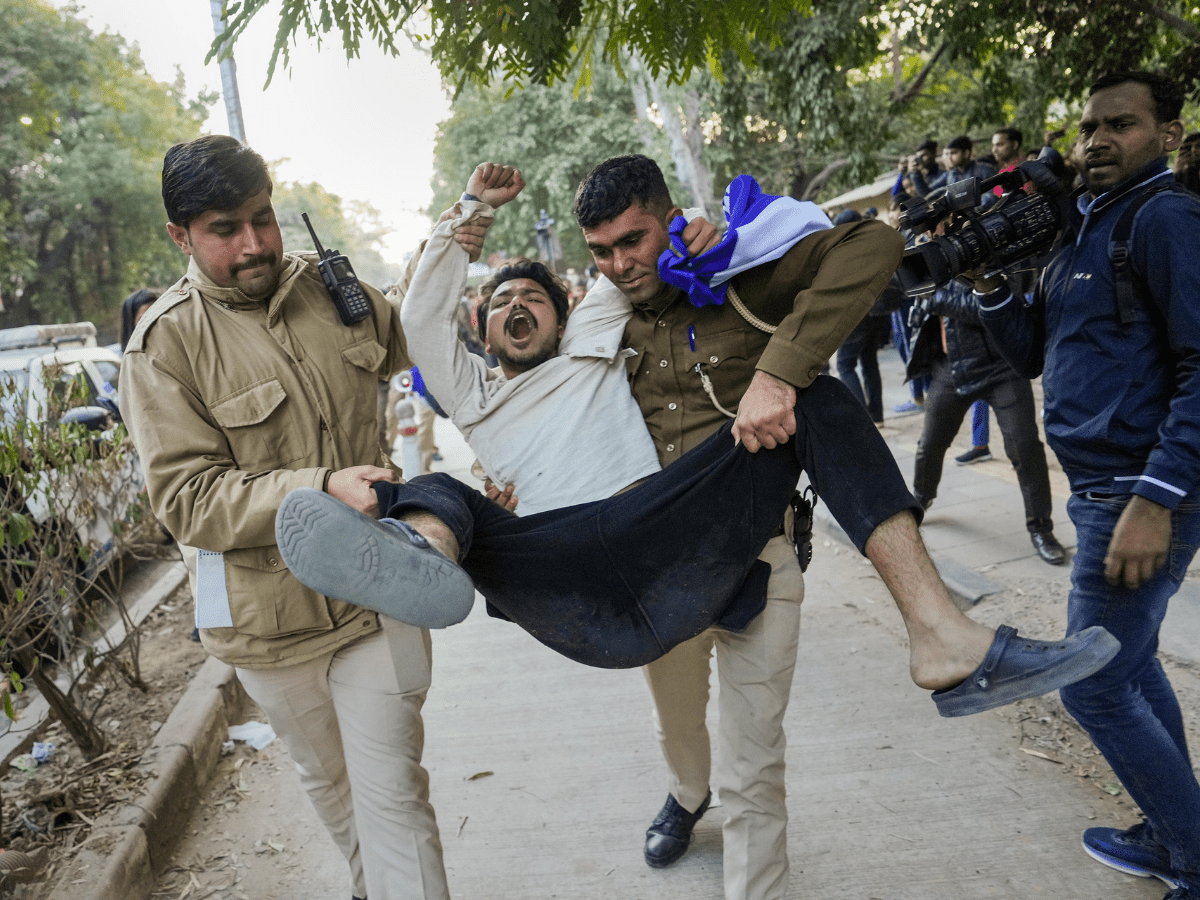
New Delhi: Delhi University Vice Chancellor Yogesh Singh has said the attempts by some students’ organisations to screen the controversial BBC documentary were aimed at creating “chaos” in the varsity and asserted that indiscipline on the campus will not be tolerated.
In an interview to PTI, Singh said the DU was “open to collaboration” with foreign institutions and Universities while new courses are in the pipeline and infrastructure upgradation is top priority.
“The motive behind (the screening) was to create chaos and cause indiscipline. They managed to do so as well,” Singh said.
“I will not allow such behaviour on the campus that is why a seven-member committee was constituted to investigate the matter,” he added.
The Congress-affiliated National Students’ Union of India and the Bhim Army Student Federation had last month said that they would screen the controversial documentary on the 2002 Gujarat riots titled India: The Modi Question’ at different times in DU’s North Campus.
Commotion had erupted on the day of the screening on January 27 as police and university administration prevented the students’ from going ahead. Twenty-four students affiliated with the NSUI were detained from the DU’s Arts Faculty.
The seven-member committee, headed by Chief Proctor Rajni Abbi, was constituted after the incident to investigate lapses in security and suggest ways to strengthen security on the campus.
The committee submitted its preliminary report on January 31 and it is holding talks with the parents of the students involved as part of its detailed investigation, the vice chancellor said.
“The investigation is underway and very soon, the result will be out,” Singh said.
The two-part documentary claims it investigated certain aspects relating to the 2002 Gujarat riots when Prime Minister Narendra Modi was the chief minister of the state.
Talking about the upcoming session, Singh said, like last year, the university will conduct admissions through the Common University Entrance Test (CUET) this year too, however, the process will be much smoother as the university is well prepared.
He also suggested that the CUET should be conducted twice a year.
“Last time was the first time and we faced some issues. The ideal situation would be conducting CUET twice a year. The best performance should be considered and I am hopeful UGC will consider this,” Singh said.
According to the vice chancellor, despite taking several initiatives to fill all the 70,000 seats in the university, around 5,000 seats remained vacant last year.
It was not due to the CUET, but because there are few courses that are not so popular and they end up finding few takers, he said.
“Earlier too, some seats remained vacant. In some colleges, the seats remained vacant in certain categories. In minority institutions too, seats remain vacant,” he pointed out.
Last year, a row between the St. Stephen’s College and the DU administration grabbed headlines as the college refused to accept the admission criteria prepared by the varsity, saying it was a minority institution.
The varsity had then allowed the the prestigious college to conduct interviews for admission of undergraduate students from the minority category.
It was only after the order of the Supreme Court that the admission process commenced at the college as it conducted admissions for seats reserved for Christian candidates based on interviews.
Singh said the matter has been resolved and from this year, the college will hold admissions through the CUET only.
Singh announced that admissions in all DU colleges will be conducted through the CUET only and no interviews will be conducted.
After the St. Stephen’s College refused to accept the admission criteria of the varsity
Singh also listed the priorities for the university in the coming years, saying: “We have to improve the university, facelift our infrastructure, and launch new projects, including buildings and courses. We want to improve our international ranking. Several projects are in pipeline. Two academic blocks and then a few hostels.”
The university is banking on a Higher Education Financing Agency (HEFA) loan that is expected to come through this year.
Asked about plans to expand outside Delhi or abroad, the vice chancellor said the administration has “not thought about” setting up campuses in other parts of the country.
“And outside India, we are open to collaboration. As of now, there is no plan to expand DU outside India,” he said.
Terming the recent ban on non-vegetarian food in Hansraj College “trivial matter”, the vice chancellor said if the principal wants to implement the values of Arya Samaj, nobody should have any issues with it.
“It is a trivial issue. Food habits depend on individual choices. But when we are in a college promoted by the Arya Samaj and if the principal wants to implement the values of Arya Samaj, we should support it,” Singh said, adding that people should put their egos aside.
Singh reiterated that the DU will continue to give honours degree to students opting for a three-year course despite the UGC norms.
The University Grants Commission (UGC), in draft norms in December, informed that students will get an undergraduate honours degree only after completing a four-year course.
However, the DU refused to accept the norms, saying it will continue to give honours degrees to students opting for a three-year course.



